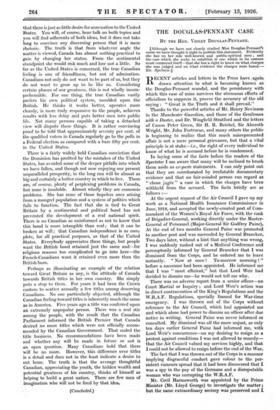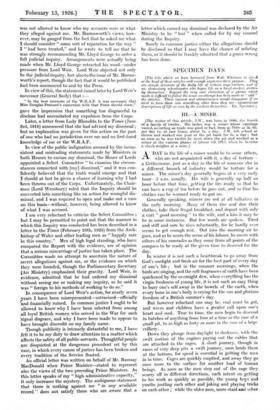THE DOUGLAS-PENNANT CASE
BY THE HON. VIOLET DOUGLAS-PENNANT.
[Although we have not closely studied Miss Douglaa-rennanes cause we have thought it right to publish this statement. Evidently she has on her side well-known and public-spirited men ; and the case which she seeks to establish is one which in its essence must corttmend itself—that she has a right to know on what charges she was judged and on what evidence the charges were based.— En. Spectator.] RECENT articles and letters in the Press have again; drawn attention to what is becoming known as the Douglas-Pennant scandal, and the persistency with which this case of mine survives the strenuous efforts of officialism to suppress it, proves the accuracy of the old saying : "Great is the Truth and it shall prevail."
Thanks to the powerful articles of Mr. Henry Nevinson in the Manchester Guardian, and those of the Gentleman with a Duster, and Dr. Wingfield Stratford and the letters of Canon Peter Green, Sir H. R. Reichel, Sir Almroth Wright, Mr. John Fortescue, and many others the public is beginning to realize that this much misrepresented affair is not a mere personal grievance, but that a vital principle is at stake—i.e., the right of every individual to know of what he is accused before he is condemned.
In laying some of the facts before the readers of the Spectator Jam aware that many will be inclined to brush them aside as ex-parte statements. I can only point out that they are corroborated by irrefutable documentary evidence and that no fair-minded person can regard as "chose jug& " a case in which the charges have been withheld from the accused. The facts briefly are as follows :- At the urgent request of the Air Council I gave up my work as a National Health Insurance Commissioner in June, 1918, and accepted the newly-created post of Com- mandant of the Women's Royal Air Force, with the rank of Brigadier-General, working directly under- the Master- General of Personnel (Major-General Sir Godfrey Paine).
At the end of two months General Paine was promoted to another post and was succeeded by General Brancker.
Two days later, without a hint that anything was wrong, I was suddenly rushed out of a Medical Conference and peremptorily informed by General Brancker that I was dismissed from the Corps, and he ordered me to leave instantly. "Now at once ! To-morrow morning ! " before a successor had been appointed. He informed me that I was "most efficient," but that Lord Weir had decided to dismiss me—he would not tell me why.
There was no adverse report from a senior officer—no. Court Martial or Inquiry ; and Lord Weir's action was in direct contravention of the King's Regulations and the W.R.A.F. Regulations, specially framed for War-time emergency. I was thrown out of the Corps without reference to the Air Council, which had appointed me and which alone had power to dismiss an officer after due notice in writing. General Paine was never informed or consulted. My dismissal was all the more unjust, as only ten days earlier General Paine had informed me, with Lord Weir's concurrence—on my desiring to resign as a protest against conditions I was not allowed to remedy— that the Air Council valued my services highly, and that I could not be allowed to resign before the end of the War.
The fact that I was thrown out of the Corps in a manner implying disgraceful conduct gave colour to the per- sistent rumours spread that it had been discovered that I was a spy in the pay of the Germans and a disreputable woman who was corrupting the W.R.A.F.
Mr. Cecil Harmsworth was appointed by the Prime Minister (Mr. Lloyd George) to investigate the matter ; but the same extraordinary secrecy was preserved and was not allowed to know who my accusers were or what they alleged against me. Mr. Harmsworth's views, how- ever, may be gauged from the fact that he asked me what I should consider " some sort of reparation for the way" I "had been treated," and he wrote to tell me that he was strongly recommending Mr. Lloyd George to order a full judicial inquiry. Arrangements were actually being made when Mr. Lloyd George retracted his word—under pressure from Lord Weir. Lord Weir objected not only to the judicial inquiry, but also to the issue of Mr. Harms- tvorth's report, though the fact that it would be published had been announced to and by the Press.
In view of this, the statement issued later by Lord Weir's successor (General Seely) that :— " In -the best interests of the W.R.A.F. it was necessary that
Miss Douglas-Pennant's connexion with that Force should cease,"
gave the impression that something too disgraceful to disclose had necessitated my expulsion from the Corps.
Later, a letter from Lady Rhondda to the Times (June 3rd, 1919) announced that she had advised my dismissal ; but no 'explanation was given for this action on the part of one who had no jurisdiction over me and no first-hand knowledge of me or the W.R.A.F.
In view of the public indignation aroused by the incon- sistent and misleading statements made by Ministers in -both Houses to excuse my dismissal, the House of Lords appointed a Select Committee "to examine the circum- stances connected with [my] dismissal," and it was con- Wently believed that the truth would emerge and that should at last be given a chance of learning why I had been thrown out of the Corps. Unfortunately, the Chair- -man (Lord Wrenbury) ruled that the Inquiry should be converted into something like an action for wrongful dis- missal, and I was required to open and make out a case on this basis—without, however, being allowed to know of what I was accused.
I am very reluctant to criticize the Select Committee ; but I may be permitted to point out that the manner in which this Inquiry was conducted has been described in a letter to the Times (February 25th, 1925) from the Arch- bishop of Wales and other leading men as "happily rare in this country." Men of high legal standing, who have compared the Report with the evidence, are of opinion that a serious miscarriage of justice has taken place. The Committee made no attempt to ascertain the nature of secret allegations against me, or the evidence on which they were founded, though the Parliamentary Secretary 'Air Ministry) emphasized their gravity. Lord Weir, in evidence, admitted that he had ordered my dismissal without seeing me or making any inquiry, as he said it was "foreign to his methods of working to do so."
In consequence of Lord Weir's action, for nearly seven ?rears I have been misrepresented—ostracized—officially and financially ruined. In common justice I ought to be allowed to know why I have been selected from among all loyal British women who served in the War for such ignal disgrace, and why I have been made to appear to 'have brought discredit on my family name.
Though publicity is intensely distasteful to me, I have _felt it to be my duty to draw attention to a matter which -affects the safety of all public servants. Thoughtful people 'are disquieted at the dangerous precedent set by this case, in which every canon of justice has been broken and every tradition of the Service flouted.
An official letter was written on behalf of Mr. Ramsay MacDonald when Prime Minister—stated to represent also the views of the two preceding Prime Ministers. As this letter speaks of my "high administrative capacity," it only increases the mystery. The ambiguous statement that there is nothing against me " in any available record" does not satisfy those who are aware that a letter which caused my dismissal was .declared by the Air Ministry to be " lost " when called for by my counsel during the Inquiry.
Surely in common justice either the allegations should be disclosed so that I may have the chance of refuting them, or it should be frankly admitted that a grave wrong has been done.



















































 Previous page
Previous page